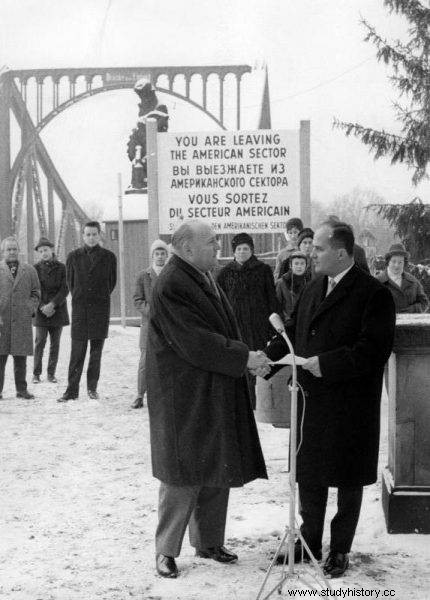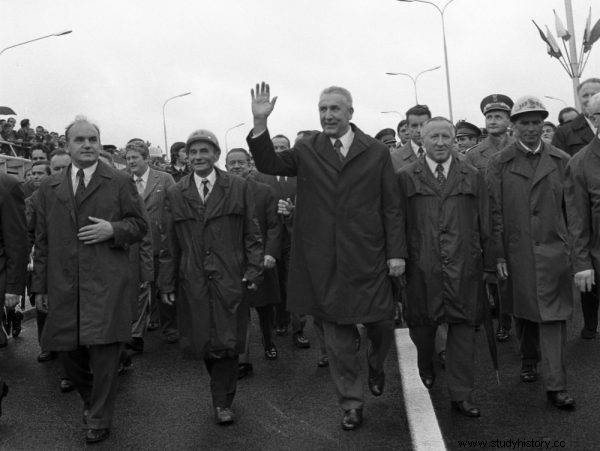In the 1970s, PRL intelligence used the biography of a living person to send a double to the West. Under false data, spy Janusz Kaczmarek ended up in West Germany.
It is not about a visual imitation, of course, but about using the first name, surname and part of the biography of another person. Under false data, spy Janusz Kaczmarek ended up in West Germany, where he managed to find a job in the office for displaced persons, an institution dealing with people who were in Germany and came, for example, from the communist bloc countries. He had there, among others access to sensitive knowledge about whose resumes raise any doubts of this office. Kaczmarek blended into the German environment and for several years passed information to the communist intelligence service of the People's Republic of Poland. Until…
Jerzy Kaczmarek was born in Poznań in November 1951. He came from the so-called departmental family - his father was an officer of the Security Office. Although in 1955 he was dismissed for not denouncing his boss, the PZPR, to which his wife belonged, did not allow him to do any harm; he received an excellently paid job in a managerial position. The Kaczmarek family lived in Poznań, where Kaczmarek studied Germanic philology. After the first year, he moved to the University of Karl Marx in Leipzig.
Stolen Identity
The future spy was recruited to cooperate as a communist intelligence agent in 1977 when he was in his twenties. After passing a trial period, began working on German duplicate papers. He was given a new identity and surname - Janusz Arnold. The real Arnold was born in 1946. His mother, a native German, sent him to an orphanage when he was one year old, and she left her native Pomerania - which became part of Poland after the war - just like hundreds of thousands of other Germans.
Jerzy Kaczmarek suited the mission in Germany perfectly. He knew German very well, as well as the customs and way of thinking of the Germans . He learned about it during his studies in Leipzig. It is possible that Kaczmarek was recruited for future service while still studying, because at that time trusted people were sent to Leipzig to study.

It is possible that Kaczmarek was recruited for future service while still studying, because trusted people were sent to Leipzig at that time (illustrative photos).
The young agent had no objections to the identity theft. He believed that, as an employee of Polish intelligence, he was bound by the orders of his superiors and that he was acting for the good of the homeland. He was also falsely informed that his double was seriously ill and would not live long. Kaczmarek did not penetrate the truth of SBecja's words.
So a communist spy stole someone else's identity and left for West Germany. This hoax launched a chain of tragic events. Using the identity of Heinz Peter Arnold aka Janusz Halicki, a resident of the Tri-City, of German descent, Kaczmarek spied in Bremen, in what was then West Germany in 1978–1985. Soon after Kaczmarek was exposed, the "giver" of his assumed identity died under mysterious circumstances.
The real Janusz Arnold
The story that ended on the "spy bridge" on February 11, 1986 began 40 years earlier. After Lębork was taken over by the Red Army, one of the German officers became interested in the 25-year-old resident of the city, Hildegarda Arnold. The German woman was raising her daughter alone, while her husband was declared missing at the front. A Soviet officer who "was very handsome, with blonde hair and spoke German," started an affair with Hildegard, and she gave birth to a son a year later. And it was this boy who in the future became the original for Jerzy Kaczmarek, a follower of the PRL intelligence service.
The Russian soon disappeared from Hildegard's life, but a spouse was found who, as could be expected, did not accept the child. In 1947 the Arnolds were displaced to Bremen, they did not take the boy with them. He was placed in an orphanage in Lębork, where he was given a new Polish name, Janusz.

The text is an excerpt from the book by Teresa Kowalik and Przemysław Słowiński "Sobowtóry", which has just been published by the Fronda publishing house.
Little Janusz was soon adopted by a childless Polish couple and took the surname of his new parents. He moved to Sopot with them. Janusz Halicki grew up on the coast without the slightest idea of his roots. Only in the second half of the 1970s, as a mature man, husband and father of two children, he accidentally found a document proving his German origin. This information shocked him. His family recalled that he could not come to terms with the fact that his biological mother had abandoned him.
So he decided to find her. He did not realize that by acting through state institutions, he had no chance of it. The Gdańsk unit of the Security Service of the People's Republic of Poland selected him as an ideal candidate for an identity giver for Polish intelligence agents. Halicki was prevented from issuing a passport, and his search for his mother through the Polish Red Cross ended in a fiasco.
"Lovely family finding"
Hildegard Arnold also tried to search for her son through the Polish Red Cross. She also failed to do so. At the same time, the Polish intelligence established that part of Hildegard's family living in West Germany lived in eastern Germany. Of course, the Stasi helped in organizing Kaczmarek's visit to the GDR and "miraculously finding his family".
"Dear Aunt Hildo," her nephews told Hildegard, "you'll probably be surprised to read this, and we preferred to let your aunt know otherwise, but we want to do so as soon as possible." On Saturday, February 12, 1977, a handsome young man in his 30s knocked on the door of our apartment. He said his last name was Arnold and that he was looking for his family. You can imagine our surprise. ”
On the occasion of "happily finding the family" it was revealed that Hildegard had also been looking for her son for years. So when she finally found him, she immediately made correspondence contact.

Jerzy Kaczmarek's story ended on the "spy bridge" on February 11, 1986
The meeting of "mother" and "son" did not take place quickly, however. In order for everything to look very real, the passport formalities were not rushed. At that time, during the Cold War, they lasted a long time. It was only a year after his visit to East Germany that the agent received a two-week visa and went to West Germany. Hildegard picked up the false son from the train station and spent the whole day with him. They only parted in the evening. She accommodated him at her daughter's apartment and started back home.
Another meeting was to take place the next day. However, it never happened. There are many indications that the heart of the nearly 60-year-old Hildegard did not endure the remorse that had been repressed for many years, combined with the joy of finding her missing son. The woman died of a heart attack in a taxi she was returning home from meeting her "son". It was a strange death. And although there are known specificities that trigger a heart attack, in this case their use did not make much sense. The death of a German woman could completely thwart the intricate plan of Polish intelligence.
Spy in position
Kaczmarek's superiors were convinced that the question of his return to Poland was a matter of the next few days. Nobody expected that the story would turn out completely different. After Hildegard's death, Kaczmarek gave the impression of a deeply moved person. It is difficult to say whether he was driven by sincere emotions or just a calculated spectacle. Anyway, her brother showed up at Hildegard's funeral to extend a helping hand to his false nephew and help him start a new life.
Hildegard's brother was an active member of the SPD (German Social Democratic Party of Germany). Thanks to his extensive acquaintances, Kaczmarek not only obtained German citizenship at an express pace, but also a job at the Federal Office for Emigration for late displaced persons in Bremen. It is worth remembering that Kaczmarek even used German clerical jargon flawlessly, which allowed him to take up this job almost overnight.
Soon Kaczmarek also joined the ranks of the SPD, which gave him a chance for a political career. He was planning to enter the local government authorities and even become an MP. So it was all the more valuable to the People's Republic of Poland. Thanks to his work in the Bremen office, the fake Heinz Peter Arnold became a mine of knowledge for Polish intelligence. And it was not only about broad access to many documents of various German offices.
His hands passed, among others applications of Polish emigrants who applied for refugee status in western Germany. After 1981, many Solidarity activists were among them. These requests contained a great deal of valuable information about the people who remained in the country.
The search for truth
In Germany, the Germans, forced to leave their homes after the war, were treated according to special rules; they received a flat and enjoyed numerous privileges in terms of access to work. Kaczmarek was also recognized as such a displaced person. Thanks to this, he was able to perfectly arrange himself in Bremen. A favorable circumstance was also the normalization of diplomatic relations between Poland and Germany after Edward Gierek took power. As part of the so-called family reunification, the Polish authorities allowed over 100,000 people to emigrate from the region of Silesia, Kashubia and Masuria.
Kaczmarek maintained contacts with the headquarters through radio monitoring, using a receiver commonly available on the West German market. From time to time he was also visited by couriers from the headquarters. Jerzy Kaczmarek took over someone's identity so consistently and played the role assigned to him so reliably that he would probably never have left West Germany if it were not for the persistence of the real Heinz Arnold who remained in Poland who at all costs wanted to find his biological mother. With disastrous results for myself.

A favorable circumstance was also the normalization of diplomatic relations between Poland and Germany after Edward Gierek took power.
He managed to find the original birth certificate in Lębork. He learned the identity of his biological mother. He knew, however, that he would never get a passport, and questions to the Polish Red Cross remained unanswered. It was all about chance. In 1984, Heinz Peter Arnold, while visiting his friends' house, met a couple of German tourists who had come to see the former Danzig. He handed them his birth certificate and asked for help in finding his biological mother.
After returning to West Germany, tourists fulfilled their promise and reported to the local Red Cross. German officials quickly realized that the person with the given personalities had come to West Germany a few years earlier. So it was obvious that one of the two Arnolds had to be a substitute spy . Officers from West German counterintelligence immediately took an interest in the matter.
Fatal final of the hoax
Kaczmarek was arrested in mid-March 1985. A lot of incriminating evidence was found in his apartment, including a carved nutcracker in which a Polish spy hid ciphers. The media boomed all over Germany, and the Polish mole was threatened with many years of imprisonment. However, Kaczmarek's superiors did not intend to leave their agent to their fate. They took steps to release him from prison. They turned to the Stasi, the intelligence of the communist East Germany, for help.
East German services proposed to include Kaczmarek in the next spy exchange. So it was done. In February 1986, the last exchange of captured spies during the Cold War between the intelligence services of the Eastern bloc and Western bloc countries. The exchange took place on the famous Glienicke Bridge, also known as the Spy Bridge, connecting the then West Berlin with the German Democratic Republic. One of those mentioned was Jerzy Kaczmarek.

The East German services suggested including Kaczmarek in the next spy exchange (illustrative photo).
Shortly after Kaczmarek's arrival in Poland, in June 1985, Janusz Halicki died in Gdańsk. His wife, who was called to the militia station, was informed that her husband had suffered a heart attack and died on the station bench. He was only 38 years old. The record said he had had two heart attacks before, while the daughter said she had never had heart problems before. Despite the family's request, the prosecutor did not order an autopsy (...).
Jerzy Kaczmarek remained in Polish intelligence until the political breakthrough. In February 1990, he retired at his own request. Shortly thereafter, he got a job at Międzynarodowe Targi Poznańskie, where he made an impressive career. (…) This interesting, but at the same time extremely grim story clearly shows how great politics can ruin the lives of ordinary people. People who, against their will, became pawns on the spy chessboard and paid a terrible price for it.
Source:
The text is an excerpt from the book by Teresa Kowalik and Przemysław Słowiński "Sobowtóry", which has just been published by the Fronda publishing house.
